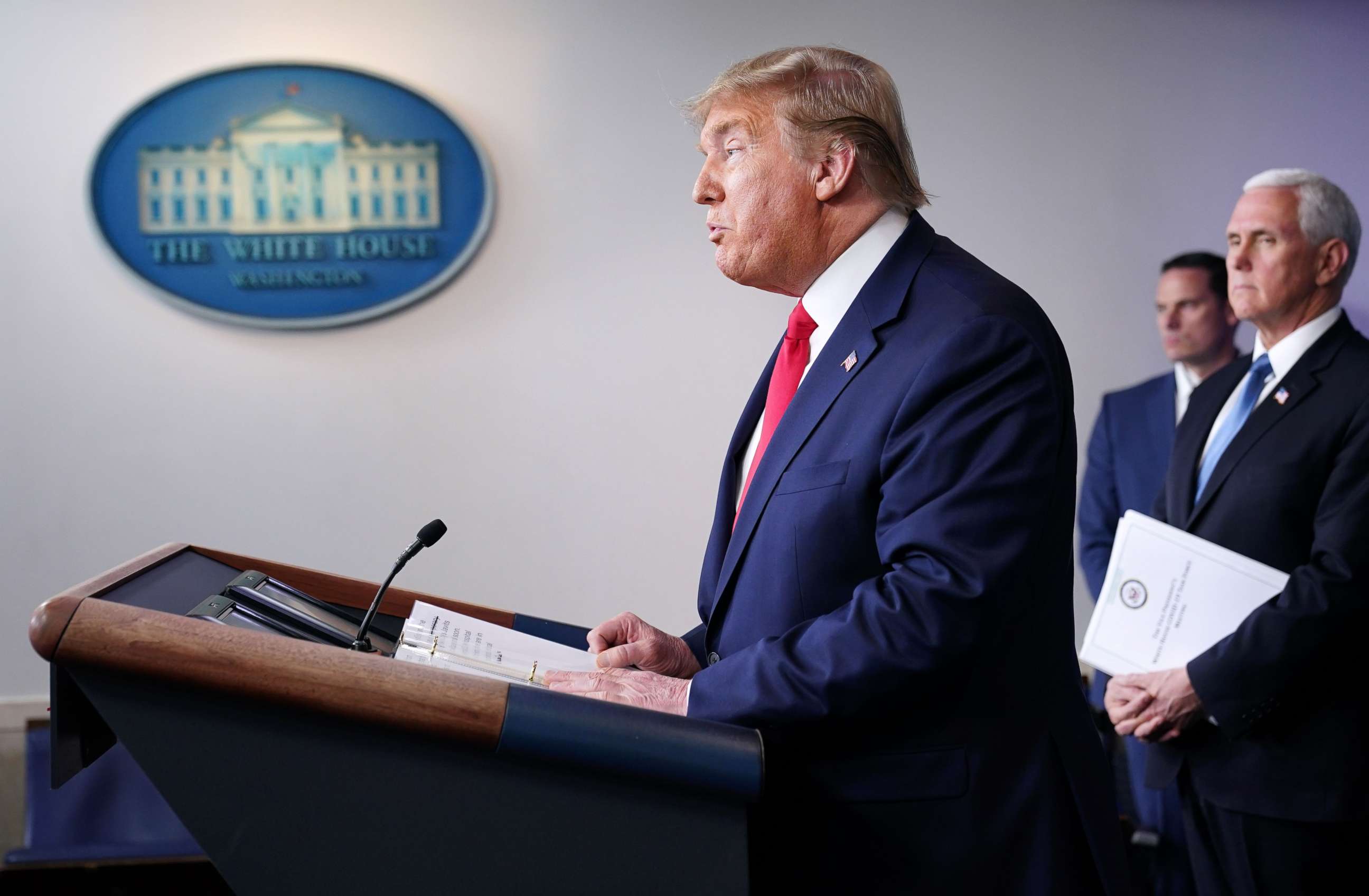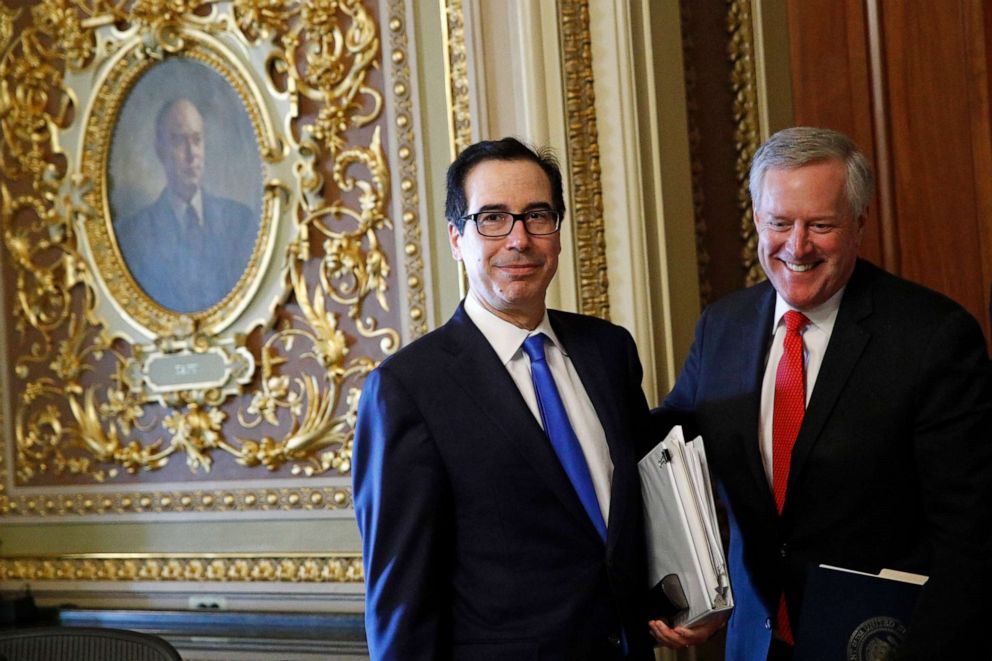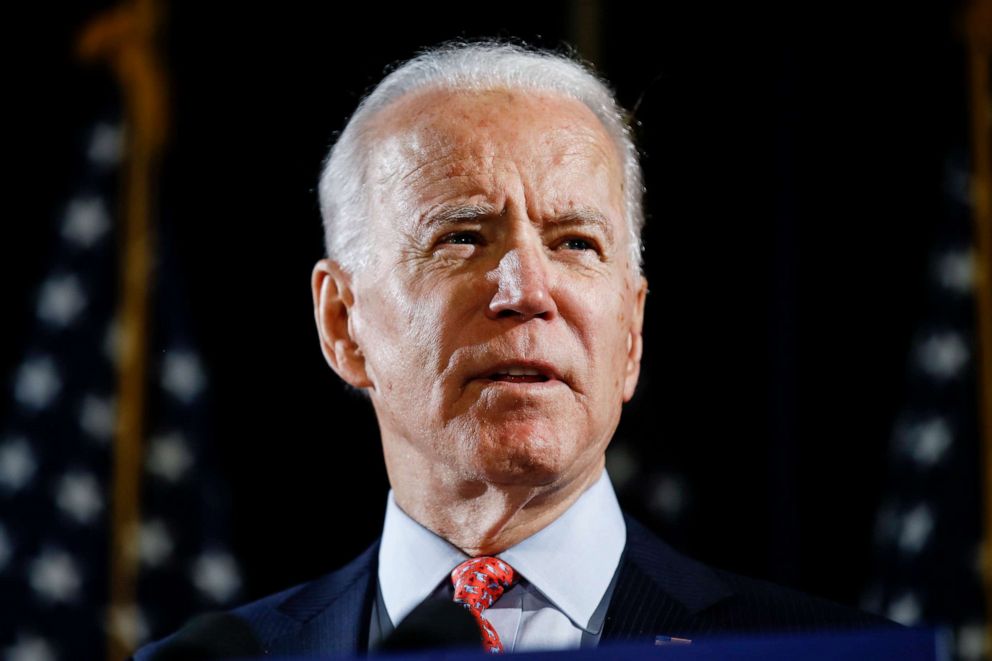The Note: Biden digs in as Trump inches toward stark choices
"He should stop talking and start listening," Biden said about Trump.
The TAKE with Rick Klein
If President Donald Trump has already made fateful choices in the new coronavirus crisis, wait for what's to come.
Trump appears unwilling if not unlikely to wait on the advice of medical professionals before nudging American society back to life. It's as stark and bleak a choice as any president can face: human life or economic life.
Enter former Vice President Joe Biden, who has been out of the storyline for much of the past week but is suddenly seeking to be everywhere. The not-quite-presumptive Democratic nominee is starting to respond in real-time to a president who is dominating the news with his own messaging.

"He should stop talking and start listening," Biden said on CNN.
Team Biden is ramping up livestreams and social-media messaging, in addition to TV interviews and a "virtual roundtable with young Americans" scheduled for Wednesday. Biden's operation is being forced to adjust to modern communications realities -- and is arguably being nudged along by the still-ticking campaign of Sen. Bernie Sanders, which is more adept in this realm.
Elections are always about choices.
Those choices could hardly be starker -- as outlined by the president, and now also by the man who is exceedingly likely to go up against him this fall.
The RUNDOWN with MaryAlice Parks
Overnight, White House officials and Senate leaders announced they had reached a bipartisan deal, in principle, on a $2 trillion stimulus package aimed at helping families, hospitals and business during the crisis.
"In effect, this is a wartime level of investment in our nation," Senate Majority Leader Mitch McConnell told reporters early Wednesday, announcing the deal after midnight. "The men and women of the greatest country on earth are going to defeat this coronavirus and reclaim our future. And the Senate is going to make sure they have the ammunition they need to do it."
When asked if the president will sign this deal, Treasury Secretary Steven Mnuchin said, "Absolutely."
The White House has in the last 24 hours publicly considered a crisis-management strategy that assumes some parts of the country, like New York and California, will bear the brunt of the effects of the virus, while others will not.
On the flip side, they continued to push for this nationwide, financial stimulus package.
Democrats won some serious concessions, it seems, in the latest version of the bill. But there are still a handful of question marks.
With a bill this size, huge policy decisions and spending power will be left to agencies as they administer all sorts of funds allocated in the proposed legislation. The most obvious example is the discretion left up to the federal government. It can be found in the hundreds of billions in new lending power given to the Department of Treasury, though strict oversight measures have been promised to Democrats in the latest drafts.
Democrats also secured more funding for hospitals, though it is unclear whether the hardest-hit states would definitely see the majority of these additional health care dollars. Small details will matter.

Republicans, so far, have held the line against adding in some wish-list items Democrats proposed, such as tax credits for renewable industries, new standards for airline carbon emissions or $15/hour minimum wage from companies that accept federal funds.
The latest bill looks to significantly expand unemployment insurance, which in theory will help states get money into the hands of workers whose wages were impacted by closures due to the virus. Undoubtedly though, there will be questions about whether it is enough and whether states and communities -- which may have to keep people home longer -- will have the help they need to get back on their feet down the road.
As the public wades through the unbelievably large legislation, which was put together so quickly, other provisions will draw scrutiny too. For example, does a cash payment to each family -- regardless of geography, as included in the legislation -- make sense still, if geography is determining the lived experience of this crisis
The TIP with Kendall Karson
For perhaps the first time, states are seeking to backload the primary calendar -- with one after the other moving to the last month of the nominating process -- a reversal from previous cycles when states would vie to be early. But much like everything else, the coronavirus outbreak has turned the political world on its head, and as states reorder the schedule of contests, national Democratic leaders are urging for some return to normalcy.
Instead of postponing a primary, and disrupting the entire electoral process, Democratic National Committee Chair Tom Perez has said, states should beef up their vote-by-mail operations.

It's a message echoed in the party's communications, with the DNC tech, security, party affairs and delegate selection teams signaling in a recent letter to state counterparts that shifting to vote by mail should be among the key tenets to "keep in mind," and in talking points distributed to Democrats, which offer suggested responses to the public health crisis, the committee pushes for vote by mail to "be made available to all registered voters." It's an option that the likely anointed leader of the Democratic Party, Biden, also pushed for on Tuesday.
"I think we ought to be able to conduct our democratic processes as well as deal with this issue," Biden said on CNN. "I don't think we should call off any of the elections. I think we just have to move forward -- we may have to use different means and methods." He further elaborated on the point during a second cable hit on MSNBC, saying, "We are still able to run these contests by keeping the social distance and washing down machines and the like. But also, there's a great move toward voting by mail and I think that's going to increase."
THE PLAYLIST
ABC News' "Start Here" podcast. Wednesday morning's episode features a conversation with Erika Miller, a New York resident who recently lost her husband to COVID-19. Then, ABC News Senior National correspondent Terry Moran explains why President Donald Trump continues to offer up optimism surrounding coronavirus recovery that is not echoed by top scientists. And, ABC News' Trish Turner brings us the latest on the coronavirus stimulus package. http://apple.co/2HPocUL
ABC News' "Powerhouse Politics" podcast. Ronald Klain, a campaign adviser to former Vice President Joe Biden and former White House Ebola coordinator, will join ABC News Political Director Rick Klein and ABC News Chief White House Correspondent Jonathan Karl to talk about the novel coronavirus pandemic, the Biden campaign's response and how the White House is reacting. https://bit.ly/2w091jE
WHAT YOU NEED TO KNOW TODAY
Download the ABC News app and select "The Note" as an item of interest to receive the day's sharpest political analysis every weekday.
The Note is a daily ABC News feature that highlights the key political moments of the day ahead. Please check back tomorrow for the latest.




